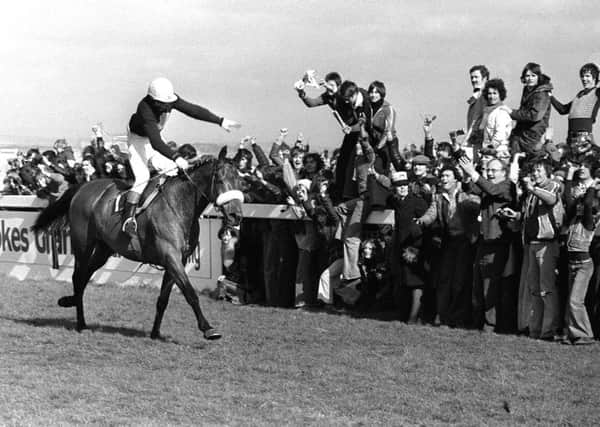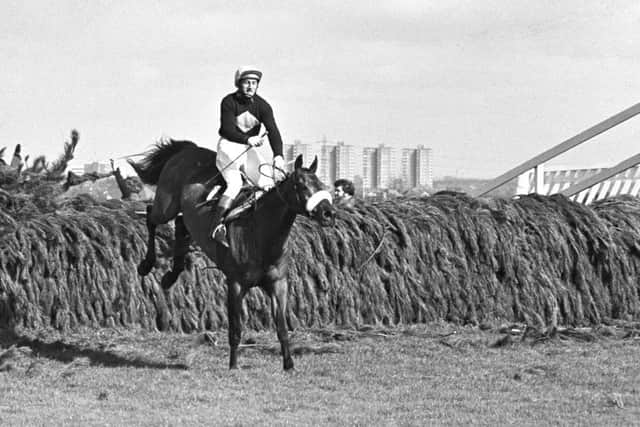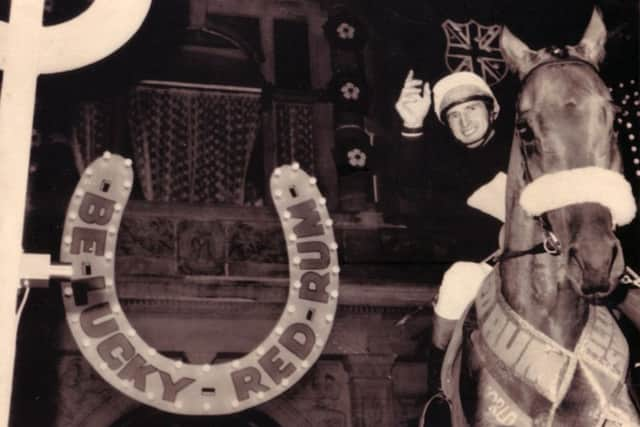Bygones: '˜My win on Red Rum seems like yesterday', recalls 1977 National-winning jockey Tommy Stack


No longer able to hear replays of the late Sir Peter O’Sullevan’s mellifluous commentary – “It’s hats off and a tremendous reception – you’ve never heard one like it at Liverpool” – after being lucky to survive meningitis nearly a decade ago, the cruel illness did not, thankfully, dim the treasure trove of memories.
Now assistant to his son Fozzy, who has taken over the training licence at the Stack family’s stables in County Tipperary, the 71-year-old taught himself to lip-read so he could understand the feedback of his jockeys even though he could not hear the cheers of the crowd.
Advertisement
Hide AdAdvertisement
Hide AdA series of detailed emails to The Yorkshire Post have revealed his heartfelt gratitude to the county – and trainers – that was so instrumental to a riding career which reached its zenith on April 2, 1977, when Ginger McCain’s wonder horse, owned by Noel LeMare, galloped into the record books.


He was an unlikely jockey – his mother wanted him to be a vet or a priest. When his school friend Barry Brogan’s father Jimmy, a trainer, died, he became immersed in horse racing.
Yet, when he wrote to a dozen English trainers in 1965 asking for a job, only Middleham’s Neville Crump replied, and in the negative. Undeterred, Stack joined Ripon-based Bobby Renton, whose Freebooter had won the 1950 National for owner Lurine Brotherton.
“Bobby Renton’s butler picked me up at Leeds Bradford Airport. I didn’t know anybody in England so he sent me to live with an elderly couple in the farmhouse,” he recalled. “They were a lovely couple and on my arrival asked me if I could milk cows, which I had done many a time at home in Ireland. So I milked the cows with pleasure for them every day.
Advertisement
Hide AdAdvertisement
Hide Ad“After a few days, I got to know everybody in the yard and they were very kind to me. From then until now, Yorkshire has a very big place in my heart.


“Bobby Renton and Mrs Brotherton gave me my first chance and I will be forever grateful to them for that. The first winner I ever rode for them was at Wetherby over hurdles on a horse named New Money. I am very pleased to hear that Mrs Brotherton’s grand-daughter Serena (a leading amateur rider) is doing so well now.”
Stack means it – his emails humming with gratitude for all those who helped him to become champion jockey in both 1974-75 and 1976-77.
It is one of the great ironies that Renton’s yard included a diminutive former Flat horse called Red Rum – so named because the letters spell the word ‘murder’ in reverse – who Stack regularly rode over hurdles and fences (this horse ran 14 times in 1969-70 over obstacles, a work-rate which is unthinkable today).
Advertisement
Hide AdAdvertisement
Hide AdThey did not always click, Stack recalling “an inauspicious schooling session where he almost fell at the first fence and all but refused at the ditch”.


The then jockey is the first to credit Ginger McCain – the car dealer who used Southport’s beach as a makeshift gallop – for the making of Red Rum.
“Bobby Renton sold Red Rum as he had problems with his feet at the time and Ginger McCain bought him,” he said.
“I was at the sales and he asked me to ride him whenever he ran, but I told him not to school him.
Advertisement
Hide AdAdvertisement
Hide Ad“The salt water improved his feet no end and that was the making of him.


“What Ginger did with Red Rum, nobody else would have done with him. Early on, I thought he wouldn’t win a Grand National because he was too intelligent and smart but every time he ran in Aintree he ran well.”
It was Brian Fletcher who was in the saddle when Red Rum won the 1973 National, hauling in the faltering but heroic leader Crisp, in the shadow of the post before conquering Aintree again the next year and being denied by L’Escargot in the hat-trick quest.
Yet Fletcher, who died earlier this year, and McCain had a parting of the ways, with Stack second on Red Rum in 1976 before their date with sporting destiny 12 months later.
Advertisement
Hide AdAdvertisement
Hide AdCarrying 11st 8lb and the hopes of the nation, Stack says McCain’s pre-race instructions were “to ride him like you always do, take your time and be in no hurry” as 42 runners went to post.
He says there was just one moment of minor alarm. “Going down to Becher’s the second time, Andy Pandy was about six lengths in front of me,” recalled Stack.
“I could hear the crowd roaring, but couldn’t see why. At Becher’s, I was halfway over when I saw Andy Pandy had fallen and I just missed him.”
Yet Churchtown Boy, winner of the Foxhunters Chase 48 hours previously, was still a menacing presence as Red Rum crossed the Melling Road and galloped towards the last two fences and racing immortality.
Advertisement
Hide AdAdvertisement
Hide Ad“He (Churchtown Boy) hit the second-last hard and I knew from then he wasn’t a danger,” said Stack.
“From then on, I knew he wouldn’t be beat, so I just kept him in the middle of the course.
“After the last, I just kept him to the middle of the track because it went through my mind what happened to Devon Loch (the Queen Mother’s horse fell while leading the 1956 National on the run-in) and kept him away from the shadow of the water jump.
“That night we went back to the hotel in Southport. Red Rum came into the ballroom and stayed there for about an hour. The place was packed to capacity and it didn’t bother him in the slightest. It was the most special of days.”
Advertisement
Hide AdAdvertisement
Hide AdYet this was a horse and jockey who transcended sport, none more so than when Red Rum was led into the studio for 1977 BBC Sports Personality of the Year.
Stack was not there in person – he broke his hip in 12 places when a recalcitrant horse reared up and crushed him in Hexham’s paddock on September 5. “They put me on traction where the only thing touching the bed were my shoulders for three months, with weights on the end of the bed pulling my pelvis back together,” he revealed.
“I went in a fit 10 stone and when they took me off traction just before Christmas I was eight stone and I could hardly move.
“The Sports Personality of the Year was on so I went into the TV studios in Leeds and it was amazing the way Red Rum came into the studio with no bother. I was in a wheelchair and every time they asked me a question the horse pricked his ears, he knew I was still around.
Advertisement
Hide AdAdvertisement
Hide Ad“One Christmas, I had to turn on the lights in Blackpool riding Red Rum out onto a balcony about two storeys high. I found it safer riding him over Becher’s than doing that!”
Though Stack won his race to be fit for the 1978 National, Red Rum was lame on the eve of the race and retired as a champion.
The jockey returned to Ireland where he became a Classic-winning Flat trainer. “I am in good health now, thankfully,” he adds. “I still keep busy around the farm and have plenty to do. The thing to do when you are getting older is keep yourself busy and keep as fit as you can. I can remember that day (1977 National) like it was yesterday.”
Tommy Stack’s message of thanks...
WITHOUT the support of Yorkshire trainers, Tommy Stack knows that he would not have become champion jockey twice in the 1970s – or have become associated with a magical little horse called Red Rum.
Advertisement
Hide AdAdvertisement
Hide AdHowever, his only request in his emails is “to thank all the Yorkshire trainers for all the help they gave through the years”.
A roll-call of Yorkshire racing history, he specifically names Tommy Shedden, Jack Hanson, Charlie Hall, Bobby Renton, Mick Easterby, Jimmy Fitzgerald and Anthony Gillam.
It has been both humbling, and a privilege, to be asked to do so.